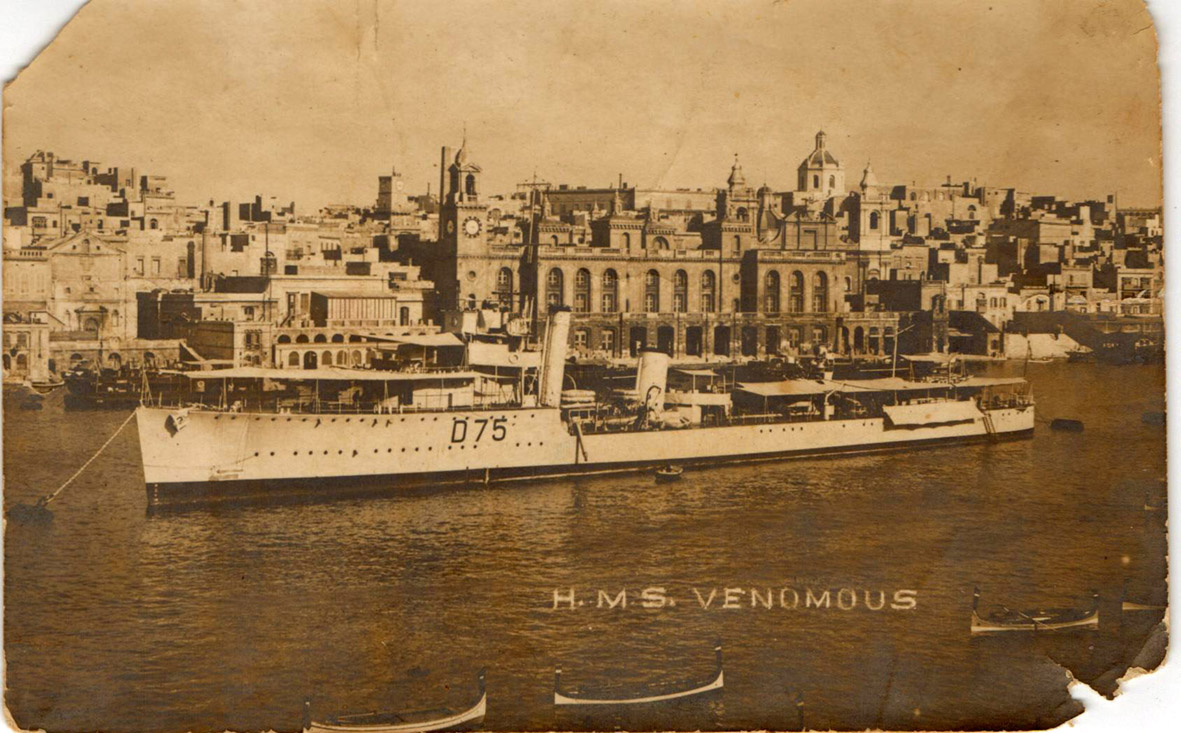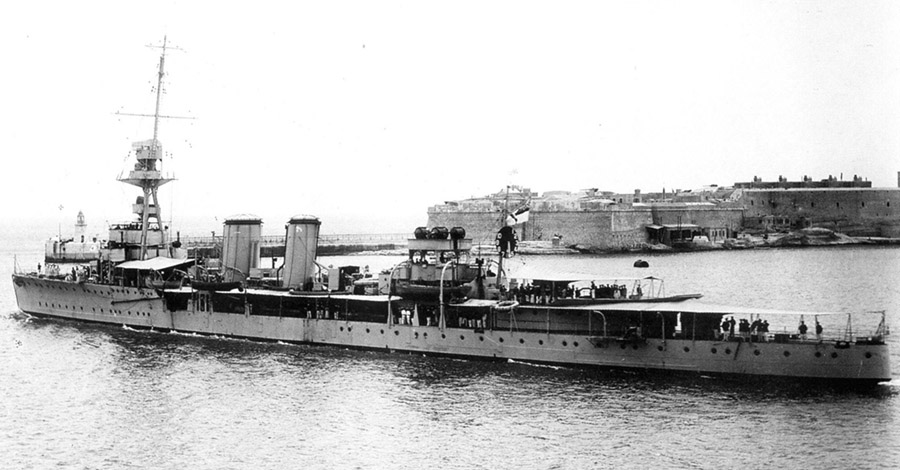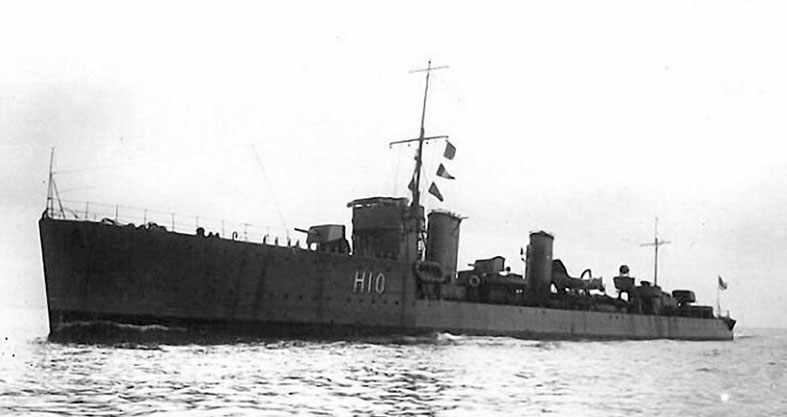The Grand Harbour, Valletta, 2 November 1924

The four passengers were Major Gilbert Huggins, second-in-command of the Gordon Highlanders stationed at Malta, Mrs Huggins, their son Ulric, aged 11 and Lieutenant (later Captain) Cronyn RN, who had invited the Huggins to tea in Calypso. The passengers embarked at Custom House Steps, Valetta, the adults sheltering from the hot sun under the old fashioned painted canopy.
While crossing the Grand Harbour, the boat heeled sharply as HMS Venomous approached. Lieutenant Cronyn moved quickly to the stern sheets and saw immediately that disaster threatened. He shouted a warning to Major and Mrs Huggins and threw Ulric overboard as the boat was rammed amidships, turned over and sank.
Ulric was carried clear of the destroyer by its bow wave and supported by the Gordon kilt he was wearing. Lieutenant Cronyn was sucked under the vessel but being a strong swimmer got clear, and always remembered the horrified look of the first lieutenant on the bridge of Venomous. Major Huggins went down with the boat but surfaced in a near drowning condition. The cox’n and his stoker jumped overboard and swam clear.
HMS Umpire, a modified R-Class destroyer with the pennant number H10 on its side, lowered its boat and rescued passengers and crew.
Mrs Huggins failed to get clear of the canopy and found herself trapped in the wreckage but able to breathe due to an air-pocket in a bulge of the canopy. She freed her leg from an obstruction; launched herself clear and saw blackness give way to violet, then to blue and finally a green diffused light before shooting out of the water waist high into the brightness of day. A cry went up “there she is” and she was quickly hauled out of the water. She had been at the bottom of the harbour in 12 fathoms for about 10 minutes. Remarkably she suffered no ill-effects from her ordeal and insisted on walking up the companionway of Calypso unassisted.


The accident and its aftermath are described on the web site of Veterans Aid:
“Mrs Huggins, on her return to England and mindful of the miracle that had saved her husband, her son and herself from drowning, prayed daily that some work which needed doing might be shown to her. However, none of the projects which came her way appealed and it was not until 1930 when, on visits to London, she was stopped frequently by down and out ex-Service men asking for help, that a scheme to help them began to formulate in her mind.
A canteen and recreation room for destitute ex-Service men was opened at Belvedere Road, Lambeth, London SE1, in January 1932 and named H10. Additional accommodation was obtained, a hostel opened and a night shelter established in co-operation with other societies and in 1933, the title Embankment Fellowship Centre was adopted. During the Winter of 1934-35, the Fellowship provided 23, 091 nights of shelter and 53,382 meals for destitute former Service men.”


HMS Venomous moored in Vittoriosa Creek on the opposite side of the Grand Harbour from Valletta.
Vittiorosa was the centre of the admiralty's operations in Malta and the Mediterranean.
The foreshore buildings were all used for naval operations and included the headquarters of the Admiral of the Mediterranean Fleet.
The building with the clock tower on the right was the naval bakery and is now the Malta Maritime Museum.
Courtesy of Ralph Ayre, grandson of PO Billy Walton of HMS Venomous, 1944-6
An entry in the log book of HMS Calypso, a light cruiser of the Mediterranean Fleet, for 2 November 1924 reads: Vittiorosa was the centre of the admiralty's operations in Malta and the Mediterranean.
The foreshore buildings were all used for naval operations and included the headquarters of the Admiral of the Mediterranean Fleet.
The building with the clock tower on the right was the naval bakery and is now the Malta Maritime Museum.
Courtesy of Ralph Ayre, grandson of PO Billy Walton of HMS Venomous, 1944-6
“16.35 hours. Motor boat sunk in collision with Venomous, lowered boats and rescued crew”.
The four passengers were Major Gilbert Huggins, second-in-command of the Gordon Highlanders stationed at Malta, Mrs Huggins, their son Ulric, aged 11 and Lieutenant (later Captain) Cronyn RN, who had invited the Huggins to tea in Calypso. The passengers embarked at Custom House Steps, Valetta, the adults sheltering from the hot sun under the old fashioned painted canopy.
While crossing the Grand Harbour, the boat heeled sharply as HMS Venomous approached. Lieutenant Cronyn moved quickly to the stern sheets and saw immediately that disaster threatened. He shouted a warning to Major and Mrs Huggins and threw Ulric overboard as the boat was rammed amidships, turned over and sank.
Ulric was carried clear of the destroyer by its bow wave and supported by the Gordon kilt he was wearing. Lieutenant Cronyn was sucked under the vessel but being a strong swimmer got clear, and always remembered the horrified look of the first lieutenant on the bridge of Venomous. Major Huggins went down with the boat but surfaced in a near drowning condition. The cox’n and his stoker jumped overboard and swam clear.
HMS Umpire, a modified R-Class destroyer with the pennant number H10 on its side, lowered its boat and rescued passengers and crew.
Mrs Huggins failed to get clear of the canopy and found herself trapped in the wreckage but able to breathe due to an air-pocket in a bulge of the canopy. She freed her leg from an obstruction; launched herself clear and saw blackness give way to violet, then to blue and finally a green diffused light before shooting out of the water waist high into the brightness of day. A cry went up “there she is” and she was quickly hauled out of the water. She had been at the bottom of the harbour in 12 fathoms for about 10 minutes. Remarkably she suffered no ill-effects from her ordeal and insisted on walking up the companionway of Calypso unassisted.

HMS Calypso, a Caledon Class Light Cruiser built in 1917, leaving the Grand Harbour with Fort Ricasoli in the background
In 1922 it rescued the Greek royal family after a military junta seized power.
Prince Philip, the future Duke of Edinburgh, was famously taken aboard in a cot made from an orange box.
Courtesy of Terry Dickens
In 1922 it rescued the Greek royal family after a military junta seized power.
Prince Philip, the future Duke of Edinburgh, was famously taken aboard in a cot made from an orange box.
Courtesy of Terry Dickens

HMS Umpire, the destroyer with the H10 pennant number, which rescued Mrs Huggins and her family
Courtesy of Terry Dickens
The accident and its aftermath are described on the web site of Veterans Aid:
“Mrs Huggins, on her return to England and mindful of the miracle that had saved her husband, her son and herself from drowning, prayed daily that some work which needed doing might be shown to her. However, none of the projects which came her way appealed and it was not until 1930 when, on visits to London, she was stopped frequently by down and out ex-Service men asking for help, that a scheme to help them began to formulate in her mind.
A canteen and recreation room for destitute ex-Service men was opened at Belvedere Road, Lambeth, London SE1, in January 1932 and named H10. Additional accommodation was obtained, a hostel opened and a night shelter established in co-operation with other societies and in 1933, the title Embankment Fellowship Centre was adopted. During the Winter of 1934-35, the Fellowship provided 23, 091 nights of shelter and 53,382 meals for destitute former Service men.”
A rather charming ten minute film made by Michael Powell in 1939 can also be seen.
The charity now renamed Veterans Aid is still active today.
Find out how you can help
The charity now renamed Veterans Aid is still active today.
Find out how you can help
Follow
in the wake of HMS Venomous
on this web site
Venomous played an important part in Operation Pedestal which broke the Axis blockade of the “George Cross Island” in 1942

Holywell House Publishing
88 Holywell Hill, St
Albans, Hertfordshire AL1 1DH, Britain
http://holywellhousepublishing.co.uk
Telephone: +44 1727 838595
contact online
http://holywellhousepublishing.co.uk
Telephone: +44 1727 838595
contact online






